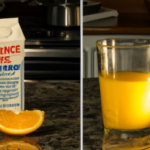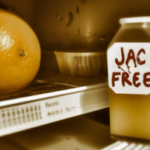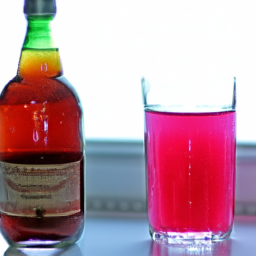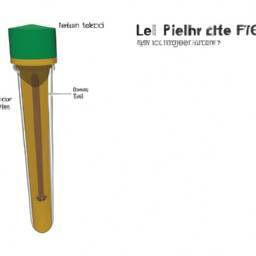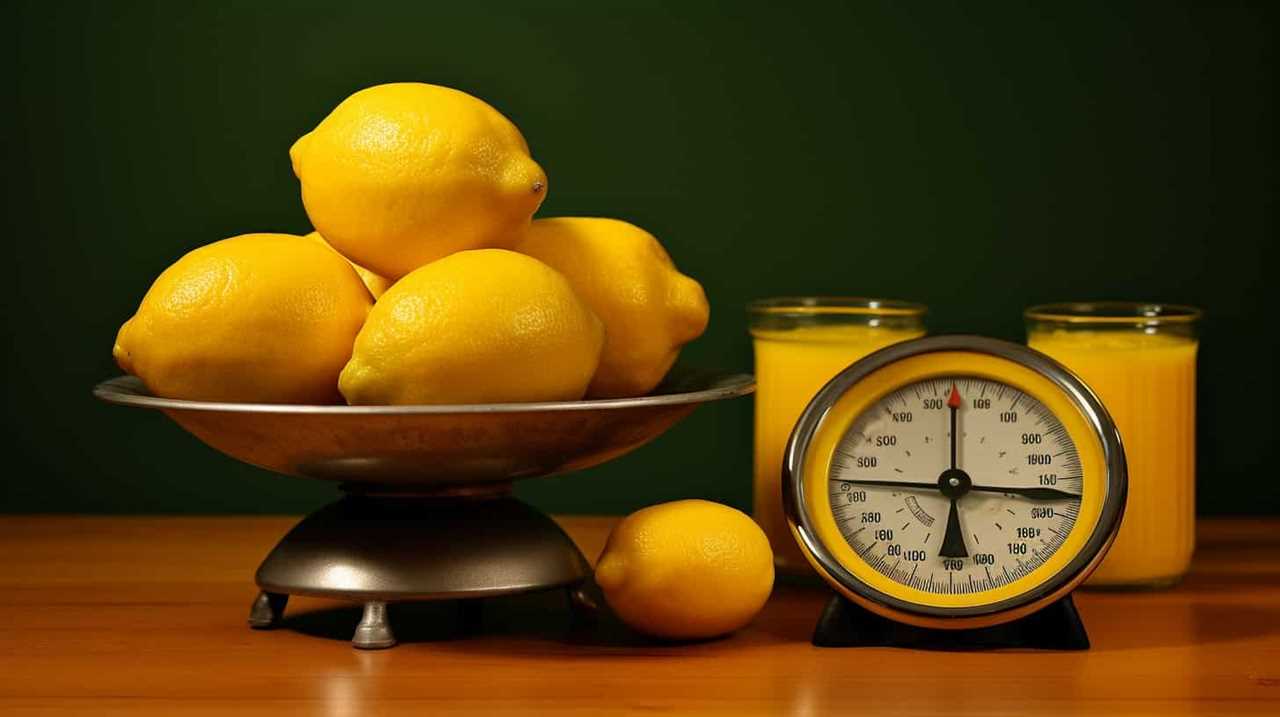As a big fan of orange juice, I know the feeling of dread when you come across a carton left out on the counter for too long. The thought of wasting even a single glass of this delicious citrus drink can be devastating. So, how long can orange juice sit out before it goes bad? Let’s explore the science behind the shelf life of orange juice at room temperature and ways to prevent having to throw any away again.
First things first, let’s paint a picture. It’s a warm summer day, the sun is shining, and you’ve just poured yourself a tall glass of freshly squeezed orange juice. But as you get caught up in the day’s activities, you forget about your drink and leave it sitting on the counter. Hours later, you remember your once refreshing beverage, now warm and unappetizing. The thought of taking a sip makes you cringe. But is it actually unsafe to drink? That’s what we’re here to answer.
Key Takeaways
- Orange juice can be kept at room temperature for up to two hours before spoiling
- If left out of the fridge for more than two hours, orange juice should be discarded
- The longer orange juice is left out of the fridge, the more likely it is to spoil
- Proper storage and refrigeration are essential to maintaining the freshness and quality of orange juice
The Shelf Life of Orange Juice
So, how long can ya leave that orange juice out before it goes bad? The shelf life of orange juice depends on various factors such as the type of orange juice, the storage container, and the storage conditions.
Freshly squeezed orange juice typically has a shorter shelf life than pasteurized or processed orange juice. Another important factor is the storage container. Orange juice stored in glass containers can last longer than those stored in plastic containers because glass does not react with the juice.
Moreover, exposure to air and light can also affect the shelf life of orange juice. Therefore, it’s important to store orange juice in airtight and opaque containers to increase its shelf life.
Now, let’s talk about the impact of temperature and storage on the shelf life of orange juice.
Temperature and Storage
When it comes to storing orange juice, temperature is key. Ideally, orange juice should be stored at a temperature between 32°F and 40°F to ensure maximum freshness and quality.
To properly store orange juice, it is important to keep it in a tightly sealed container in the refrigerator and avoid exposing it to light and air. If you need to chill orange juice quickly, placing it in the freezer for 15-20 minutes can do the trick.
The Ideal Storage Temperature
You should keep your orange juice in the fridge because it’ll last longer than if you leave it out on the counter for weeks on end, as if it’s indestructible.
The ideal storage conditions for orange juice are at a temperature between 32-40°F, which is the temperature range of a refrigerator. Keeping orange juice at this temperature slows down the growth of bacteria and mold, which can spoil the juice and affect its quality.
To ensure that your orange juice stays fresh and tasty, there are a few key tips for proper storage. First, make sure to keep the juice in its original container and tightly seal it after each use. Second, avoid exposing the juice to light as this can cause oxidation and negatively impact the flavor.
Finally, always check the expiration date and consume the juice before it goes bad. By following these simple tips, you can enjoy delicious and refreshing orange juice for longer periods of time.
Tips for Proper Storage
Properly storing your favorite chilled beverages requires using the correct temperature and tightly sealing the container after each use. When it comes to orange juice, you should always store it in a proper container and keep it in the refrigerator at a temperature between 35°F and 40°F. This will help to preserve its freshness and flavor.
If you need to take your orange juice with you on the go, you can keep it at room temperature for up to two hours before it starts to spoil. However, it’s important to note that once the container has been opened, the juice should be consumed within a few days. To ensure that your orange juice stays fresh for as long as possible, make sure to always use a clean glass or plastic container with a tightly sealed lid. Additionally, always store the orange juice in the refrigerator when not in use to slow down the spoiling process. If you’re wondering how long orange juice lasts out of the fridge, it typically shouldn’t be left unrefrigerated for more than two hours, especially in warmer conditions. By following these storage tips, you can help maintain the juice’s freshness and flavor. It’s also worth considering that the shelf life of orange juice can vary depending on whether it’s freshly squeezed or commercially packaged. Freshly squeezed juice typically has a shorter shelf life compared to the pasteurized versions that you find in stores, which may contain preservatives to extend their longevity. Regardless, proper storage remains key to maximizing the shelf life of orange juice and preventing potential spoilage.
To chill your orange juice quickly, there are a few methods you can try. One option is to place the container in a bowl of ice water for a few minutes. Another option is to pour the juice into a plastic bag and place it in the freezer for about 30 minutes.
Regardless of which method you choose, remember to always keep your orange juice properly stored to ensure its freshness and quality.
How to Chill Orange Juice Quickly
Want your OJ chilled ASAP? Try these quick methods for ice-cold refreshment in minutes! Quick chilling is an essential step in preventing spoilage and extending the shelf life of your orange juice. The best way to chill your OJ quickly is by using ice and cold water. Simply fill a large bowl with ice and water and place your OJ carton or bottle in it. Let it sit for about 15-20 minutes, and voila! Your OJ is ready to drink and enjoy.
Another quick method of chilling your orange juice is by using a freezer. Pour your OJ into a freezer-safe container and place it in the freezer for about 30-45 minutes. Remember to set a timer to avoid freezing the juice. Once it’s done, remove it from the freezer, give it a quick stir, and serve it immediately. By following these two methods, you can have chilled OJ in minutes without compromising its quality or taste. Now, let’s move on to the next step, which is minimizing exposure to light.
Exposure to Light
I want to discuss the impact of light on orange juice and the proper way to store it. Light can affect the quality of orange juice by breaking down important nutrients and creating off-flavors. To prevent this, it’s best to store orange juice in a dark, cool place such as a refrigerator.
By doing so, you can ensure that your orange juice stays fresh and full of nutrients for a longer period of time.
The Impact of Light on Orange Juice
Leaving orange juice in direct sunlight for even a few minutes can quickly turn it into a disgustingly sour and unpalatable beverage. The impact of light on orange juice is twofold: oxidation and nutrient loss, and flavor and quality degradation. Here are a few reasons why:
- Exposure to light can lead to the breakdown of vitamin C, a vital nutrient in orange juice.
- Light also triggers the oxidation of certain compounds in orange juice, which can lead to a loss of flavor and quality.
- Orange juice that’s packaged in glass bottles is more susceptible to light damage than juice in Tetra Pak containers.
- The impact of light on orange juice can be minimized by storing it in a dark, cool place.
Proper storage is key to keeping orange juice fresh and delicious. In the next section, I’ll discuss how to store orange juice properly, so it can stay out of the fridge for longer periods without spoiling.
How to Store Orange Juice Properly
Properly storing your favorite citrus beverage is essential to preserving its freshness and taste. One of the best ways to store orange juice is in a glass container that’s tightly sealed. Glass containers won’t react with the citrus acid found in orange juice, ensuring that the taste and quality of your juice remains intact.
It’s also important to keep in mind that plastic containers can degrade over time and release chemicals that may alter the taste of your juice. Another important factor in properly storing orange juice is refrigeration. It’s recommended to always store orange juice in the refrigerator as it helps to slow down the natural process of oxidation that occurs when the juice is exposed to air.
If you plan to consume the juice within a day or two, storing it in the fridge will be sufficient. However, if you want to keep the juice for a longer period of time, freezing it in small portions can be a great option. This will allow you to thaw only what you need and avoid waste.
Properly storing orange juice in a glass container and keeping it refrigerated will help to preserve its freshness and taste for a longer period of time. However, if you want to learn more about how preservatives can play a role in extending the shelf life of orange juice, keep reading.
The Role of Preservatives
Hey, buddy, don’t even think about chugging that carton of OJ that’s been sitting on your countertop for a week – unless you want to experience the full force of the preservatives (and probably regret it later).
The role of preservatives in orange juice is to increase its shelf life, prevent bacterial growth and maintain its fresh taste and color. Chemical additives such as sodium benzoate, ascorbic acid, and citric acid are commonly used to preserve orange juice.
However, consuming large amounts of preservatives can have negative health effects. Sodium benzoate, for instance, can cause allergic reactions, while excessive consumption of ascorbic acid can lead to diarrhea. It’s essential to consume orange juice in moderation and to always check the expiration date.
Speaking of which, let’s now move on to the next section, where we’ll discuss the risks of drinking expired orange juice.
Risks of Drinking Expired Orange Juice
Now that we know the role of preservatives in keeping orange juice fresh, let’s talk about the risks of drinking expired orange juice. It is important to note that orange juice, like any other food, has an expiration date. Once the expiration date has passed, the juice can become a breeding ground for harmful bacteria, such as E. coli and salmonella. Consuming expired orange juice can lead to food poisoning, which can cause symptoms such as nausea, vomiting, and diarrhea. In severe cases, it can even lead to hospitalization.
To better understand the health risks of drinking expired orange juice, let’s take a look at the table below:
| Symptoms | Bacteria | Onset of symptoms | Duration of illness |
|---|---|---|---|
| Nausea, vomiting, diarrhea | Salmonella | 12-72 hours | 4-7 days |
| Abdominal cramps, diarrhea | E. coli | 1-10 days | 5-10 days |
As you can see, the symptoms of food poisoning can be quite severe, and it is important to always check the expiration date before consuming orange juice or any other food. When it comes to your health, it is always better to be safe than sorry.
In order to avoid the health risks associated with expired orange juice, it is important to always check the expiration date and consume the juice before it expires. Additionally, storing orange juice properly in the fridge can also help to extend its shelf life. With these tips in mind, let’s move on to the next section and talk about how to choose the best orange juice.
Tips for Choosing the Best Orange Juice
To ensure that you select the highest quality orange juice, it’s advisable to examine the label and look for keywords such as ‘100% pure’ or ‘not from concentrate.’ These phrases indicate that the juice is made purely from oranges without any added sugars or preservatives.
Another factor to consider is the orange juice varieties available in the market. Some popular options include Valencia, Navel, and Blood oranges, each with its unique flavor profile. It’s essential to choose the variety that suits your taste preferences.
In addition to taste, the nutritional value of orange juice is another crucial factor to consider. Orange juice is an excellent source of Vitamin C, which boosts the immune system, and potassium, which promotes heart health. However, some orange juice brands may have added sugars or high fructose corn syrup, which can increase calorie intake and contribute to weight gain. Therefore, it’s best to opt for pure orange juice that is rich in nutrients and low in added sugars.
With these tips in mind, you can make an informed decision when selecting the best orange juice for yourself. Now, let’s move on to how to tell if your orange juice is fresh.
How to Tell if Your Orange Juice is Fresh
When it comes to determining the freshness of orange juice, there are a few key tests that I like to use. First, the smell test: if the juice has a sour or off-putting odor, it’s likely gone bad.
Next, the taste test: if the juice tastes bitter or has a strange aftertaste, it’s time to toss it.
Finally, appearance: if the juice appears cloudy or has any mold growth, it’s definitely past its prime.
By using these tests, you can ensure that you’re always enjoying fresh and delicious orange juice.
Smell Test
Got some orange juice sitting out? Give it a whiff to see if it’s still good to drink. One of the easiest ways to tell if your orange juice is no longer fresh is by smelling it.
Here are a few things to keep in mind when performing the smell test:
-
Check the expiration date on the container. If it’s already expired, it’s best to discard the juice, even if it smells okay.
-
If the juice has changed color or has become cloudy, it may indicate spoilage. In this case, it’s best not to drink it.
-
If the juice smells off or has a sour odor, it’s best to play it safe and not consume it.
Performing a simple smell test can help you determine if your orange juice is still good to drink. However, if you’re not quite sure, you can also perform a taste test to confirm.
Taste Test
Nothing beats taking a sip of that freshly poured juice and feeling the burst of flavor in your mouth to confirm if it’s still good to drink. While the smell test can give you some idea of the state of your orange juice, the taste test is the ultimate way to determine if it’s still drinkable. When conducting a sensory evaluation of your juice, you’ll want to pay attention to your taste preferences and how they match up with the flavor of the juice.
To give you a better idea of what to look for, here’s a table outlining the potential taste changes that may occur as orange juice sits at room temperature:
| Time out of fridge | Potential taste changes |
|---|---|
| 0-2 hours | No noticeable changes |
| 2-4 hours | Slightly sour or bitter taste |
| 4-8 hours | Noticeably sour or bitter taste |
| 8+ hours | Strongly sour or bitter taste, may be undrinkable |
Of course, the actual changes in flavor will vary based on factors like the temperature of the room and the initial quality of the juice. It’s important to trust your taste buds and make the call based on what you’re experiencing. But if your juice has been sitting out for more than a few hours and has a strongly sour or bitter taste, it’s likely time to toss it.
Moving onto the next section about ‘appearance’, it’s important to note that while taste is a crucial factor in determining the drinkability of orange juice, there are other factors to consider as well.
Appearance
Hey, you want to make sure your OJ is still good to drink, right? Well, take a quick glance at its appearance to check for any discoloration or floating bits that may indicate spoilage.
Orange juice should have a bright and vibrant color, with no signs of browning or dullness. Any change in juice color can indicate a higher oxidation level, which means the juice has been exposed to air for too long and may have lost its freshness.
Another thing to look out for is any floating bits in the juice. These can be a sign of contamination or spoilage, and should not be consumed. Fresh orange juice should be smooth and free of any lumps or floating debris.
By checking the appearance of your orange juice, you can ensure that it is still good to drink and has not spoiled. Now, let’s take a look at how to store orange juice at home to prolong its freshness.
How to Store Orange Juice at Home
To properly store orange juice at home, it’s important to keep it chilled in the refrigerator. You should pour the juice into a container that is specifically designed for food storage, such as a glass or plastic bottle with an airtight lid. These containers will help to protect the juice from external factors that can cause spoilage, such as air and light.
When storing orange juice, the best location is at the bottom of the refrigerator. This is because the temperature is consistently cooler there, which helps to keep the juice fresh for a longer period of time. Additionally, you should avoid storing the juice near any foods that have a strong odor, as this can cause the juice to absorb unwanted flavors.
By following these tips, you can ensure that your orange juice stays fresh and delicious for as long as possible.
As for alternatives to orange juice, there are many other options available such as apple juice, grape juice, and cranberry juice. Each of these drinks offers its own unique set of health benefits and flavors, so be sure to explore your options and find the one that best suits your taste preferences.
Alternatives to Orange Juice
As someone who enjoys a glass of orange juice, I understand that it may not be everyone’s cup of tea. Luckily, there are plenty of alternatives to orange juice that can provide the same nutritional benefits and refreshing taste.
In this discussion, we’ll summarize some key points about these alternatives, share some final thoughts, and provide recommendations for those looking to try something new. So, let’s explore some delicious options that can help you start your day off right!
Summary of Key Points
If you’ve left your orange juice out of the fridge for more than two hours, you should be cautious about consuming it to avoid any potential health risks. This is because once orange juice is exposed to air, it starts to undergo an oxidation process that could lead to spoilage.
When orange juice is pasteurized, it’s heated to kill bacteria, but after that, it’s susceptible to contamination. Therefore, it’s crucial to store orange juice in airtight containers and packaging materials to prevent exposure to air and other contaminants.
It’s also important to note that different types of orange juice have varying shelf lives. Fresh-squeezed orange juice usually lasts for only a day or two, while commercially packaged orange juice can last for up to two weeks in the fridge. However, once opened, it should be consumed within a week, and if left out of the fridge for more than two hours, it’s best to discard it.
In summary, proper storage and refrigeration are essential to maintaining the freshness and quality of orange juice. When it comes to making sure your orange juice stays fresh and safe to drink, it’s always better to err on the side of caution. To prevent any potential health risks, make sure to store your orange juice properly, discard any juice that’s been left out of the fridge for more than two hours, and consume it within its recommended shelf life.
By following these simple guidelines, you can enjoy the delicious taste of orange juice without any worries.
Final Thoughts and Recommendations
Now that we’ve covered the key points on how long orange juice can stay out of the fridge, let’s talk about some final thoughts and recommendations.
As we mentioned earlier, it’s important to remember that orange juice is a perishable item and can spoil quickly if not stored properly. Therefore, it’s crucial to take the necessary precautions to prevent spoilage.
To avoid spoilage, it’s best to store orange juice in airtight containers. Glass bottles or plastic containers with tight-fitting lids are ideal for keeping juice fresh for longer periods. Additionally, it’s essential to keep the juice away from direct sunlight or heat sources as this can accelerate the spoilage process.
Lastly, it’s recommended to consume orange juice within a week of opening, even if it’s been refrigerated. By following these tips, you can enjoy fresh orange juice for longer and reduce waste.
Frequently Asked Questions
What are the health benefits of drinking orange juice?
Drinking orange juice has many health benefits, such as providing vitamin C and other important nutrients. Regular consumption of juice benefits the immune system and helps maintain healthy skin, bones, and teeth.
How is orange juice made?
Before discussing how long orange juice can stay out of the fridge, let me explain how it’s made. Orange juice production involves various processing techniques such as extraction, filtration, and pasteurization to ensure its quality and safety. One popular idiom that comes to mind is "squeezing the juice out of life."
Can you mix expired orange juice with fresh orange juice?
It is not recommended to mix expired orange juice with fresh orange juice, as the taste comparison may be unpleasant. The expired juice may also contain harmful bacteria that can cause illness.
Is it safe to drink orange juice straight from the carton?
Drinking etiquette dictates that one should not drink directly from the carton. It is also important to follow storage guidelines to ensure the safety of orange juice consumption. Proper refrigeration is essential for maintaining freshness and preventing bacterial growth.
How long does it take for orange juice to go bad if it has been refrigerated?
Orange juice has a shelf life of about 7-10 days in the refrigerator after opening. It should not be consumed past its expiration date. Storage at room temperature can lead to spoilage and it is not safe to drink expired juice.
Conclusion
In conclusion, the shelf life of orange juice can vary depending on several factors such as temperature, storage, exposure to light, and the presence of preservatives. It’s important to choose the best orange juice and know how to tell if it’s fresh.
Additionally, proper storage is crucial in order to prevent the juice from spoiling. Remember, expired orange juice can pose health risks, so it’s best to consume it before its expiration date. Always check the label and store it in the fridge after opening.
Alternatives to orange juice include other fruit juices and fortified drinks. To ensure the quality of your orange juice, practice good hygiene and sanitation when handling and preparing it.
By following these tips, you can enjoy fresh and delicious orange juice for a longer period of time. Be sure to store your freshly squeezed orange juice in an airtight container and keep it refrigerated to maintain its taste and freshness. Additionally, understanding how many oranges per gallon are needed can help you plan your juice-making process more efficiently—typically, it takes about 32 to 48 medium-sized oranges to produce a gallon of juice. Adjust the quantity based on the size and juiciness of the oranges to achieve your desired flavor and consistency.
Cindy thoroughly researches juicing trends, techniques, and recipes to provide readers with practical advice and inspiration. Her writing style is accessible, engaging, and designed to make complex concepts easy to understand. Cindy’s dedication to promoting the advantages of juicing shines through her work, empowering readers to make positive changes in their lives through the simple act of juicing.





